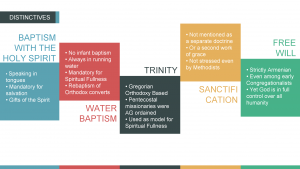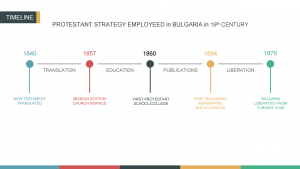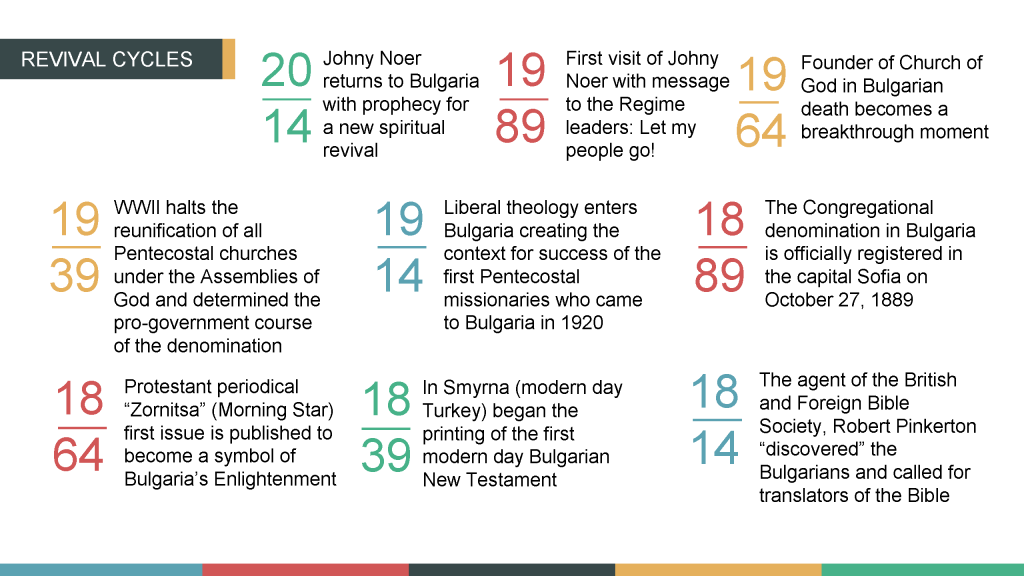Greek-Bulgarian Interlinear of the New Testament Released on All Saints Day for the 500th Anniversary of the Protestant Reformation
Our decade long work of “Greek-Bulgarian Interlinear of the New Testament with Critical Apparatus Based on Nestle-Aland 27/28 and UBS-5” in Bulgaria is now released
After working on the New Bulgarian Translation of the Bible since 1996 and more actively on the interlinear version for the past decade, on October 31, 2017 for the 500th Anniversary of the Protestant Reformation in the Bulgarian capital of Sofia on All Saints Day 2017, we presented hot off the press the first edition of the Greek-Bulgarian Interlinear of the New Testament from the critical edition of GNT.
On the picture, a symbolic stack of the first 95 copies arranged at the presentation to commemorate with the work of the great reformers.
Doctrine of Free Will among Bulgarian Protestant and Pentecostal Believers
Historical and Doctrinal Formation of Holiness Teachings and Praxis among Bulgarian Pentecostals (Research presentation prepared for the Society of Pentecostal Studies, Seattle, 2013 – Lakeland, 2015, thesis in partial fulfillment of the degree of D. Phil., Trinity College)
Another peculiar characteristic present among early Pentecostals around the globe was the subject of free will. This was not a problem for the movement in Bulgaria. As strange as it may sound, among all publications and teachings by missionaries in Bulgaria during the 19th century there is no mention of Calvinism, election or predestination. Because Bulgaria’s traditional Eastern Orthodox orientation, both Congregational and Methodist missionaries taught Armenian free will. Even though many Bulgarian ministers were educated in the Calvinistic schools like Princeton and Auburn, Calvinism never picked up among Bulgarian Protestants. With the explosive growth of Bulgaria’s Pentecostals in the 1920s, this Armenian theological heritage was widely accepted amongst the movement.
Protestant Strategies in Bulgaria during the 19th Century
April 20, 2015 by Cup&Cross
Filed under Featured, News, Publication
Historical and Doctrinal Formation of Holiness Teachings and Praxis among Bulgarian Pentecostals (Research presentation prepared for the Society of Pentecostal Studies, Seattle, 2013 – Lakeland, 2015, thesis in partial fulfillment of the degree of D. Phil., Trinity College)
The early Bulgarian protestants were mainly Methodists and Congregational. They followed the strategy of the American and British missionaries, which began with a translation of the Bible in the 1840s, followed by the first mission stations and protestant services in the 1850s.
In the following decade, Protestant schools were established in over a dozen Bulgarian cities. A broad stream of educational publications were translated and provided to schools, churches and the open public. The final goal of the missionary strategy was the establishing of churches, which began in the 1870s and continued onward.
The main sources of influence were the American Board of Commissioners for Foreign Missions (setup in Boston) with its local centers in Turkey and then Bulgaria; as well as from the British and Foreign Bible Society which also had centers in Constantinople and its main Slavic arm through the Russian Bible Society based in St. Petersburg.
Additionally, Baptists entered Bulgaria with their own mission work in 1875 and the Adventists in 1891. Although there were no Presbyterians churches in Bulgaria at that time, many of the agents sent by American Board of Commissioners for Foreign Missions were in fact Presbyterian and were educated at Princeton and Drew along with many Bulgarian protestants who studied abroad.
With all these key players present, Bulgaria was eventually introduced to the rise of Higher Criticism (1880–93) and consecutively to the movement to revise the Westminster Confession of Faith (1900–1910). It was met with great resistance among Bulgarian churches. In this context, the search for holiness among Bulgarian evangelicals began at turn of the 20th country not only as an alternative to the liberal theological thought and praxis, but as a move toward a renewed spiritual identity, which ultimately became the channel for introducing Pentecostal-Holiness teachings.
25 Year Revival Cycles in Bulgaria’s Protestant History
2014 Pastor Johny Noer visits Bulgaria with a prophecy for a new spiritual revival in the land
1989 First visit of Pastor Johny Noer in Bulgaria. The Berlin Wall fell seven months later
1964 Pastor Stoyan Tinchev of the Bulgarian Church of God passed away. This was a breakthrough moment for the ministry of the denomination, which will occupy a historical place in the Bulgarian Pentecostal movement in the next half of century
1939 In the years before WWII, Dr. Nikolas Nikoloff returned to Bulgaria in a renewed attempt to unite all Pentecostal churches in the country. Future Pentecostal Union’s president Ivan Zarev is ordained to the ministry, which determined the pro-government course the denomination would take under the Communist Regime
1914 The beginning of the Great War stopped access of American missionaries to Bulgaria and opened the doors for liberal theology to enter traditional protestant churches. This factor alone allowed the success of the first Pentecostal missionaries sent to Bulgaria by the Assemblies of God in 1920.
1889 After the bylaws of the Congregational church are accepted in the city of Pazardjik in 1888, the Congregational denomination is registered in the capital Sofia on October 27, 1889. Interestingly, exactly a century later again in the capital Sofia on October 27, 1989, the communist militia uses force to stop Green Party protestors which marks the beginning of the fall of communism in Bulgaria.
1864 The monthly protestant periodical “Zornitsa” (Morning Star) is first published to become not only the most successful protestant publication in Bulgaria, but also a symbol of Bulgaria’s Enlightenment. At the same time, ABFMC agent Charles Mors began a Bible Study in Sofia from which the first evangelical church in the capital will emerged in 1879.
1839 In Smyrna (modern day Turkey) began the printing of the first modern day Bulgarian New Testament
1814 The agent of the British and Foreign Bible Society, Robert Pinkerton “discovered” the Bulgarians within the border of the Ottoman Empire and immediately calls for translators who can translate the Bible in the local vernacular. The year marks the beginning of Protestantism in Bulgaria.
Read Also:
- Prophetic Revival in Bulgaria: The Search for Holiness Continues
- Second Varna Declaration (October 5, 2014)
Pastor-Agents of the Secret Communist Police in Bulgaria Revealed
Silence in the face of evil is itself evil: God will not hold us guiltless.
Not to speak is to speak. Not to act is to act.
Dietrich Bonhoeffer
Pastors who served as agents of the secret police during the Communist Regime in Bulgaria are being revealed this week through special legal provision of the Bulgarian Constitution, which allows secret government dossiers and archives to be made public. The law excuses ministers who are retired, immigrated or deceased as it pays special attention to people who continue to serve on denominational boards, heads of religious organizations or church pastors.
The released records have revealed a significant count of Bulgarian evangelical pastors, who have served directly under the Communist government as secret agents and are currently serving in lead positions in their respective churches and denominations. At least 17 agents have infiltrated the Pentecostal churches in Bulgaria (including the Assemblies of God, Church of God and other charismatic denominations). The count is overwhelming in comparison with the Bulgarian Orthodox Church representing some 90% of Bulgaria’s general population with only 11 regional bishops with secret police dossiers.
The newly released documents reveal that these pastor-agents served the Regime through willfully betraying and reporting fellow ministers and their respective ministries, regularly submitting the names of new believers joining their congregations and the activities of their churches as a whole. Special interest in their reports seems to have been given to “foreign religious emissaries” – missionaries from sister-denominations in other countries who visited Bulgarian evangelicals with the purpose of bringing moral and financial support, smuggling Bibles or just encouraging the churches during their time of trials and tribulations under the Regime.
Even more disturbing is the lack of definite and unified response on behalf of the current denominational leaders and the repulsiveness of the general public on the issue as a whole. While the Bulgarian Evangelical Alliance appealed for prayerful but fair dealing with the said misconducts, the Bulgarian Assemblies of God has chosen to deal with the issue internally behind closed doors and the Church of God in Bulgaria has postponed discussion to its general meeting in March or perhaps May. Several outspoken leaders from the Congregational and Apostolic churches have been unsuccessful in bringing about a public debate involving all Bulgarian Protestants, while journalistic investigations in the Christian media have been openly attacked in attempt to be kept silent.
It is understood that many of the said pastor-agents were coerced to serve as such through pressure in their jobs, friends, families and in some cases even their children. Yet, the Bulgarian churches are now struggling to cope with the fact that leading ministers within their denominational structures have continually and purposefully reported on the life of the church, thus betraying fellow believers and ministers.
Protestant Revival in Bulgaria
 On November 10, 1989, a day after the border between East and West Berlin opened, the Bulgarian Communist leader of over 30 years resigned and change toward democracy began (Lalkov, 62-63). For those of us, who lived in the final days of Communist Bulgaria, the Fall of the Wall was a modern-day miracle. Emerging from severe Communist persecution and surrounded by the Balkan religious wars, the country of Bulgaria suddenly experienced a time of liberation. Before our very eyes, began a national spiritual revival despite a collapsing economy and political insecurity. Read more
On November 10, 1989, a day after the border between East and West Berlin opened, the Bulgarian Communist leader of over 30 years resigned and change toward democracy began (Lalkov, 62-63). For those of us, who lived in the final days of Communist Bulgaria, the Fall of the Wall was a modern-day miracle. Emerging from severe Communist persecution and surrounded by the Balkan religious wars, the country of Bulgaria suddenly experienced a time of liberation. Before our very eyes, began a national spiritual revival despite a collapsing economy and political insecurity. Read more












